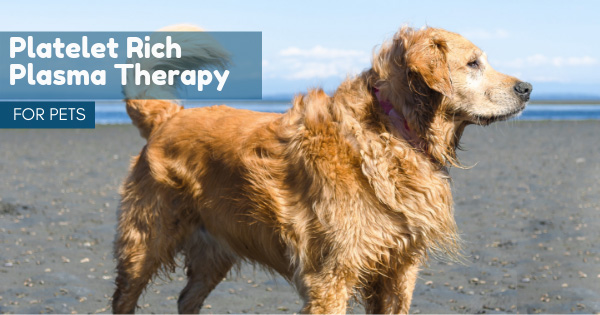
Platelet Rich Plasma therapy has been used since the early 1970s in human medicine to build bone mass and promote the healing of musculoskeletal injuries. This treatment approach is now being offered for pets to relieve the pain of injury and joint disease, promote healing and reduce recovery time.
What is Platelet-Rich Plasma (PRP)?
Blood contains white blood cells, red blood cells, and platelet cells, which are suspended in a liquid known as plasma. Platelets are small fragments of cells that help with blood clotting. Platelets-rich plasma (PRP) simply refers to blood with a higher-than-usual concentration of platelets. So, why seek more platelets? Platelets contain growth factors and proteins that help to initiate a healing response. In the event of tissue damage or injury, the body directs platelets to the affected area to encourage a brisk healing response. Injecting plasma that has a high concentration of platelets mimics the natural healing process and can also accelerate recovery.
The growth factors in platelets are thought to be the components that improve healing. In particular, these growth factors have been proven to promote the regeneration of bone or cartilage. They also stimulate the growth and proliferation of stem cells. Since stem cells are “blank cells”, they can transform into specialized cells that provide the raw material needed to repair and regenerate tissues in your pet’s acute and chronic conditions. PRP can decrease pain associated with arthritis and may also help heal tendon or ligament injuries.
What is the PRP Process?
PRP is prepared by sedating the patient and drawing blood. The amount of blood drawn is based on the size of your pet and the extent of disease. The blood will then be centrifuged to separate the plasma from erythrocytes or filtered to capture platelets. Both of these processes will provide the plasma that contains all the important components.
A needle is then inserted into the targeted area and therapy is administered until resistance is felt in the joint. This procedure usually takes 30 to 40 minutes to complete and can be done as a day procedure in the hospital. For many pets, PRP is a one-time treatment, however, some pets may need additional treatment.
What Ailments Can Benefit From Platelet-Rich Plasma Therapy?
Platelet-rich plasma therapy can benefit any condition that can also be treated with tissue repair. These include:
- Osteoarthritis
- Ligament sprains or tears
- Elbow dysplasia
- Hip dysplasia
- Muscle tears
- Bursitis
- Wounds
- Tendonitis
- General inflammation
- Tenosynovitis
- Post-surgical care
What Should You Expect Post-Therapy?
Most pets can go home immediately after the procedure is complete. Once the numbing effects of sedation dwindle, your pet will display some discomfort due to soreness at the site of the injection. Placing ice on the injection area for about 20 minutes 2-3 times a day can help ease the inflammation and pain. If needed, an oral painkiller may be used for the first few days. You might have to restrict your pet’s movement, especially when it comes to running, for the first week or two. Majority of pets will experience noticeable improvements within a week or two after treatment and can then resume normal activity.
Is PRP Therapy Safe?
Platelet-rich plasma therapy is extremely safe for your pet. Research and clinical data have shown that the injections do not have adverse effects for animals or humans. Given that platelet-rich plasma is from a portion of your pet’s own blood, immune rejection or disease transmission is not an issue. PRP injections are safe and can be combined with other treatments if desired.
Book an appointment with Naples Coastal Animal Hospital
At Naples Coastal Animal Hospital, we are committed to offering our patients the best care with the latest technology. If your pet friend is suffering from hip dysplasia, osteoarthritis, ligament injury, or any other condition, contact us today to discuss treatment options.
